Buckwheat on the SeacoastBuckwheat has to be one of my favorite plants for pollinators and while I may like it, the bees love it. I have had luck growing it myself as a cover crop, one year at the Goss Farm in Rye, NH, and have been lucky to work with farmers like Jack Clarke in Epping/Lee who planted it as part of his crop rotation. A few years ago, I was driving by the Governor Dale Farm in North Hampton when I saw a massive crop just starting to flower and I just needed to stop and ask if I could place some hives there. Josh the farmer had planted it as a cover crop and I received his permission as well as the ok from the owners of the land (Jacqui and Hank). We were able to get some good buckwheat flavors from that honey but not a mono-floral harvest that was solely buckwheat. This past year, Josh planted another cover crop and the bees were able to store away some frames of the dark nectar that was mostly buckwheat honey. Buckwheat (Fagopyrum esculentum) has been around for a long time and is not a native plant to North America. It originated in Asia and spread to Europe and eventually was brought to the Americas by the Europeans. Here in the Northeast of the United States it was once a common crop but has been replaced by other grain crops like corn and soybean. The buckwheat plant produces a white flower that eventually produces a triangular seed that looks a bit like a colonial hat. The seed is easy to collect and can be ground into flour. Buckwheat Nectar and Honey Buckwheat plants are quick to grow and will in about 10 weeks. When the flower has blossomed the plant will put out nectar for only a short duration of the day. We have observed this at many of our locations where the bees will work the crop in the morning for nectar and the afternoon for pollen only. The bees have no choice since the plant is the one shutting down the nectar flow. When the bees collect enough nectar they bring it back to the hive and store it in the honeycomb where it goes through the process of becoming honey. In most cases, that honey is mixed in with other late-season nectars like goldenrod, aster, purple loosestrife, and knotweed. The combination of these nectars makes for very dark and rich honey that you will find in our late summer bottles. In rare cases, we have frames of exclusive buckwheat you will find that the honey is extremely dark and has a rich molasses-like flavor with some straw-like after notes. Some people actually will get a barnyard type of smell/taste from their experience. I can see that but more often I prefer the description I hear when people try it is malty. I love people's reactions when they try this honey after we have tried much lighter ones and worked our way up to it.
Are you looking to plant buckwheat this season? If you need any pollinators to help the crop please reach out to us and we can see about dropping a hive off to help you with your crop.
0 Comments
|
Details
SEABEE HONEY BLOGAuthorA beekeeper in New Hampshire [email protected] Archives
December 2023
Categories
All
|


 RSS Feed
RSS Feed